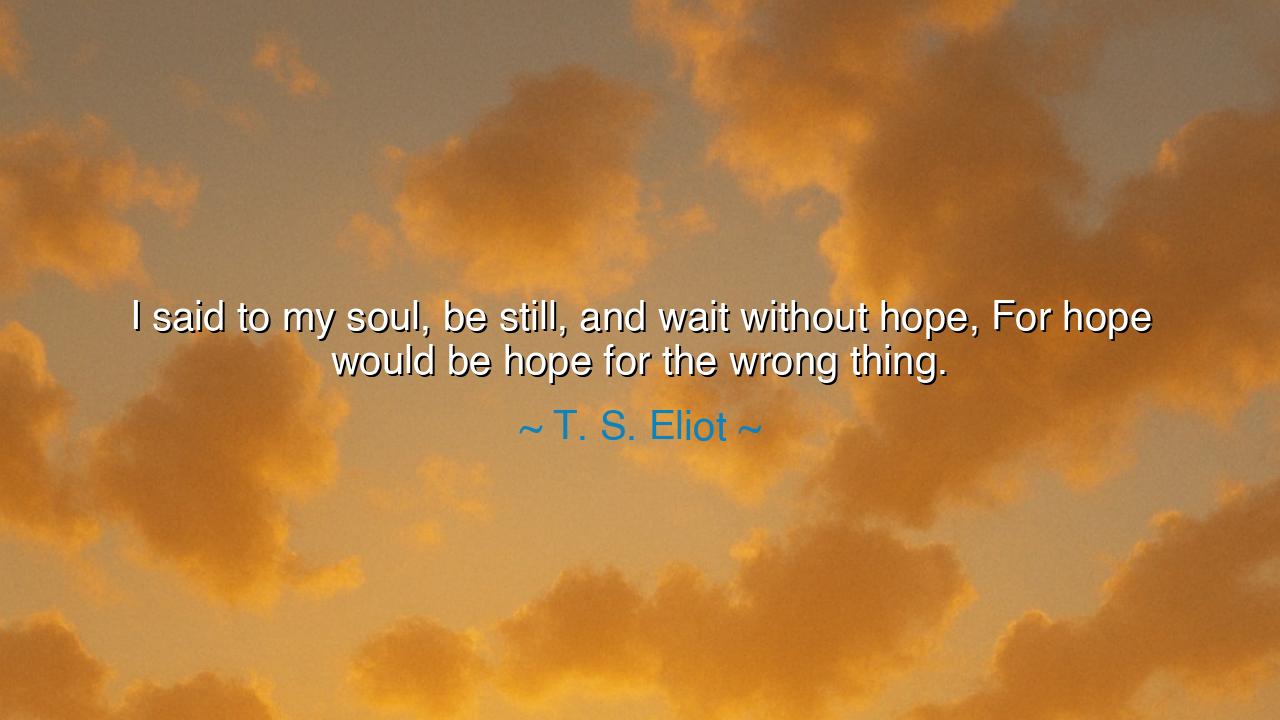
I said to my soul, be still, and wait without hope, For hope
I said to my soul, be still, and wait without hope, For hope would be hope for the wrong thing.






In the haunting and luminous words of T. S. Eliot, poet of spirit and silence, we encounter one of the deepest truths ever spoken about patience and surrender: “I said to my soul, be still, and wait without hope, For hope would be hope for the wrong thing.” These words, taken from his great work Four Quartets, emerge from the still depths of contemplation — from a soul that has looked upon the ruins of ambition and the exhaustion of desire. Eliot, once the restless modernist who sought meaning in the noise of the world, found in these lines the wisdom of stillness, of trusting not in the will’s grasping, but in the quiet unfolding of divine purpose. Here, he teaches that there are moments in life when even hope, that most cherished of virtues, must be laid aside — for the soul cannot see clearly while it clings to its own longing.
To wait without hope is not to fall into despair. It is to release the narrow desires that bind us, to surrender the illusion that we know what is best for ourselves. For the human heart often hopes for the wrong thing — for comfort over growth, for possession over peace, for the transient over the eternal. In our limited vision, we mistake the flicker of the candle for the sunrise. Eliot calls us, therefore, to a higher form of waiting — a waiting that is not fueled by desire, but by faith; not by wanting, but by trusting. This is the stillness before revelation, the silence that makes space for wisdom to enter.
The origin of these words lies in Eliot’s own spiritual pilgrimage. After years of inner turmoil, of searching for meaning amid the modern world’s chaos, he turned to Christianity and to contemplation. In Four Quartets, written during the dark years of war, he sought not to preach but to witness — to describe the soul’s journey through doubt, surrender, and renewal. The world around him was burning, yet he looked within and found the eternal flame that is never extinguished. To “wait without hope” was, for him, an act of faith in what cannot be seen — an acceptance that the divine will, not human desire, must guide the path of redemption.
This lesson has echoed through the ages. Consider the story of Job, the ancient figure of endurance. Stripped of everything he loved, surrounded by suffering and mockery, Job was told to curse God and abandon faith. Yet he did not. He did not hope for his fortunes to return, nor plead for answers; he simply waited in silence, trusting the mystery beyond his comprehension. His hope was not for comfort, but for truth. And in his surrender, he was restored — not because he demanded it, but because he had learned to be still. Like Job, Eliot’s counsel is not to abandon hope forever, but to purify it — to transform it from self-will to spiritual openness.
To be still is one of the hardest commands the soul can obey. The modern mind hungers for movement, for progress, for answers. We think that by striving, we shall find peace; by controlling, we shall be safe. Yet Eliot reminds us that wisdom blooms only in stillness, as flowers do not grow by force, but by quiet endurance under the light of the unseen sun. The soul that is still becomes a vessel through which grace can flow. When we cease to demand outcomes, the universe — or the divine — can finally whisper what we most need to hear.
And yet, this stillness is not emptiness. It is preparation. To “wait without hope” is to dwell in the holy tension between what is and what may be — to trust that meaning is forming beneath the surface, even when all appears silent. The artist must wait for inspiration, the farmer must wait for harvest, the seeker must wait for revelation. If they rush, they ruin the work; if they wait, they receive it in fullness. Eliot’s wisdom calls us to live in that sacred patience — to stand before life not with grasping hands, but with open palms.
Let this be the lesson for those who walk through uncertainty: Release your anxious hopes, and seek instead the stillness of faith. Do not pray only for what you want; pray to want what is right. When confusion surrounds you, resist the impulse to flee or to fix. Sit in silence, breathe deeply, and listen for the quiet voice within that says, Wait. For it is in that waiting — emptied of desire, yet full of trust — that true transformation begins.
And so, my children, remember the wisdom of T. S. Eliot: that there are times when even hope must rest, and the soul must wait in sacred stillness. When you surrender your will to the greater rhythm of the world, you will find that what returns to you is not what you expected, but what you truly need. In that stillness, your soul will learn to see clearly, to love purely, and to live freely — not by striving, but by being. For in the end, it is not our hopes that save us, but the faith to wait beyond them.






AAdministratorAdministrator
Welcome, honored guests. Please leave a comment, we will respond soon